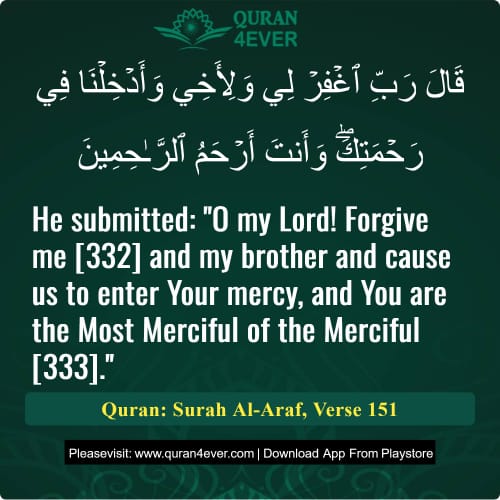
Transliteration:( Qaala Rabbighfirlee wa li akhee wa adkhilnaa fee rahmatika wa Anta arhamur raahimeen )
He submitted: "O my Lord! Forgive me [332] and my brother and cause us to enter Your mercy, and You are the Most Merciful of the Merciful [333]."
This prayer is taught for the forgiveness of the Ummah, even though Prophets are divinely protected from sins. Hazrat Musa (on whom be peace) included his brother in the supplication, despite Hazrat Harun (on whom be peace) committing no visible error. This highlights the depth of prophetic humility. From this we learn: if a spiritual mentor or teacher strikes a pupil or devotee without clear wrongdoing, no retaliation is permissible — instead, such actions should be viewed as part of spiritual guidance and concern.
By this is meant that Allah Almighty is more compassionate than parents, siblings, or any close relative. Hazrat Musa (on whom be peace) made this du‘a not only to seek forgiveness, but also to ward off any public misunderstanding — that there may be discord between him and his brother. This supplication was also meant to soothe the heart of Hazrat Harun (on whom be peace) and restore perfect harmony, demonstrating the unbreakable bond between Prophets and the superior character of reconciliation.
The tafsir of Surah Al-A’raf verse 151 by Ibn Kathir is unavailable here.
Please refer to Surah A’raf ayat 150 which provides the complete commentary from verse 150 through 151.
(7:151) Thereupon Moses said: ‘O Lord! Grant forgiveness upon me and my brother and admit us to Your Mercy, for You are most merciful of the merciful.’
There is no commentary by Abul Maududi available for this verse.

For a faster and smoother experience,
install our mobile app now.
Related Ayat(Verses)/Topics